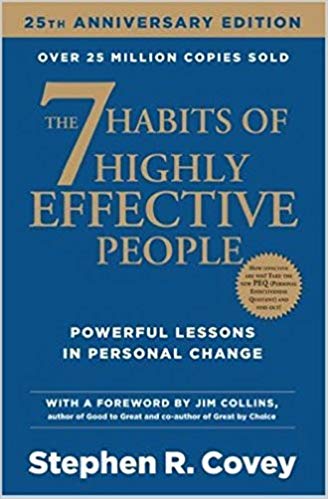

This article is an excerpt from the Shortform summary of "The 7 Habits of Highly Effective People" by Stephen Covey. Shortform has the world's best summaries of books you should be reading.
Like this article? Sign up for a free trial here .
What makes you you? Do you think what you are is determined by internal factors (thoughts, feelings, moods) or external factors (your circumstances and social identity)?
There are many different views about what makes someone who they are. Some argue that one’s self is a repertoire of their internal world (their thoughts, feelings, beliefs, values, etc.). Others say that you are the product of a combination of your genetics and conditioning.
Continue reading to understand what makes you you.
What You Are Not
In his book The 7 Habits of Highly Effective People, Stephen Covey says that understanding what makes you you requires that you first understand what you are not.
First, understand that you are not your thoughts, moods, or feelings. According to Covey, although you may think that your thoughts and emotions are expressions of your identity, they are merely expressions of your reactions to events and circumstances. Additionally, you react to your interpretation of what’s happening, and that is influenced by your paradigms—which are malleable. Change your paradigms, change how you interpret life, change how you feel.
Second, you are not your circumstances or your conditioning. Society and popular culture often tell us that we are the products of our upbringing, environment, era, culture, and other external influences. However, this view is based on determinism, which says that you are who you are and do what you do because you’re reacting to the given stimuli. That stimuli may be:
- Genetic, meaning that your DNA dictates your temperament and other traits. This is the “nature” side of nature vs. nurture. According to this theory, you’re hardwired to be the way you are.
- Psychic, meaning that your parents, upbringing, and experiences make you who you are. This is the “nurture” side of nature vs. nurture.
- Environmental, meaning that you’re a victim of the people and environment around you. These forces create your situation, and there’s no escaping your situation.
| So, What Makes You You? If you’re not defined by your thoughts, moods, or feelings, conditions, or conditioning, then what makes you you? That depends who you ask. Covey asserts that your core identity is defined by your character. According to the Handbook of Self and Identity, your identity encompasses traits, roles, relationships, and memberships in social groups. Identities can be oriented to the past (who you were), present (who you are), or future (who you hope or expect to be). In The Power of Now, Eckhart Tolle similarly writes that your identity is based on your job, education, appearance, social status, possessions, personal and family history, beliefs, relationships, and memberships in various groups (including racial and political). However, Tolle clarifies that your identity is separate from the true essence of who you are, your true Being. It’s notable that none of these definitions claim that identity is fixed. Rather, identity is dynamic and ever-evolving. |
Covey writes that the flaw in attributing your actions to your DNA, your upbringing, or your circumstances is that you leave out a key factor: Free will. Covey lists free will as one of four human endowments that allow you to deviate from your conditioned responses and consciously choose your actions.
- Self-awareness lets you know that you can break away from your conditioned responses. Imagine that your conditioned behavior is a highway, and you’ve spent most of your life on cruise control, following where the road takes you. Self-awareness would be the highway signs showing upcoming exits and interchanges.
- Imagination enables you to think outside the box and imagine how you could respond in a way that helps you achieve your goals. In the analogy, imagination is your map, helping you visualize different routes and where they’ll take you.
- Conscience enables you to gauge how well your actions align with your principles. On your imaginary roadtrip, conscience is the GPS, ensuring you don’t stray too far off the route you’ve chosen.
- Free will allows you to choose your response and act outside of your conditioning. To complete the metaphor, free will is your turn signal because it gives you the freedom to maneuver to a new route.
You must use all four endowments to live proactively.
| Determinism vs. Free Will There are multiple schools of thought about whether humans truly have free will, or if we are merely puppets of external forces and subconscious conditioning. This spectrum includes Hard determinism, which says that free will is an illusion and every human motivation and action can be traced to a cause. Behavioral psychologists like B.F. Skinner believe that environmental factors and personal experiences drive people to act—to the extent that criminals are destined to commit crimes and have no choice to deviate from their conditioning. Soft determinism, or compatibilism, which says that humans have some choice to act on desires, decisions, and character, but that this choice is constrained by external factors. This view allows determinism and free will to coexist because it redefines freedom as acting out your desires, despite the external and internal causes that influence those desires (like genetics and past experiences). Freudian psychology, which says that therapy can teach people how to break free from the control of their unconscious. Freud’s approach has a flavor of determinism, since he believes that most people are driven by their unconscious minds, but freedom exists in the choice to go to therapy and change this pattern. However, neo-Freudian Erich Fromm added that most people are too afraid to exercise this freedom. Humanism, which says that people have agency to exercise free will. Humanistic psychologists like Abraham Maslow insist that people not only have free will, but are driven to use it to reach their full potential through self-actualization. Based on this, Covey appears to align most closely with humanism, which is the most optimistic view of human behavior and potential. |
———End of Preview———

Like what you just read? Read the rest of the world's best summary of "The 7 Habits of Highly Effective People" at Shortform . Learn the book's critical concepts in 20 minutes or less .
Here's what you'll find in our full The 7 Habits of Highly Effective People summary :
- How to prioritize the hundred tasks you have to focus on the one or two that really matter
- The right way to resolve every disagreement and argument
- How to avoid burning out and succeed over 20+ years






